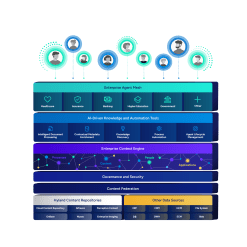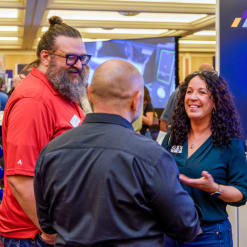Using blockchain to establish digital trust
Decision makers have to choose between spending significant time verifying the accuracy of documentation or assuming significant risks if they do not.

Harness the power of a unified content, process and application intelligence platform to unlock the value of enterprise content.
Learn more
Automate your document-centric processes with AI-powered document capture, separation, classification, extraction and enrichment.
Learn about Hyland IDPIt's your unique digital evolution … but you don't have to face it alone. We understand the landscape of your industry and the unique needs of the people you serve.
 Overview of industries
Overview of industries
Countless teams and departments have transformed the way they work in accounting, HR, legal and more with Hyland solutions.
 Overview of departments
Overview of departments
We are committed to helping you maximize your technology investment so you can best serve your customers.
 Overview of services
Overview of services

You’re shaping the future, now it’s time to celebrate your achievements at CommunityLIVE 2026.
Nominate by March 27!
Our exclusive partner programs combine our strengths with yours to create better experiences through content services.
Overview of partners
Join The Shift newsletter for the latest strategies and expert tips from industry leaders. Discover actionable steps to stay innovative.
Register now
Hyland connects your content and systems so you can forge stronger connections with the people who matter most.
Learn about HylandWith our modern, open and cloud-native platforms, you can build strong connections and keep evolving.
 Dig deeper
Dig deeper
May 22, 2022
Reading time minutes
Decision makers have to choose between spending significant time verifying the accuracy of documentation or assuming significant risks if they do not.

John Phelan
Executive vice president and chief product officer at Hyland

No matter what industry you work in, you need certain documents to be authentic.
Educational diplomas and transcripts, construction and employment contracts, legal wills and deeds, certificates of compliance and insurance, records of military service and litigation, etc. – they all need to be authentic. Because if someone in your organization unknowingly makes a decision based on fraudulent, outdated, or invalid documents, it can have disastrous impacts.
It can directly affect your organization’s finances, safety, and reputation.
For example, Colby Nolan sounds like a great potential hire. He managed a newspaper route, had a 3.5 grade point average, and even earned a Master of Business Administration.
He’s also … a cat.
It’s hilarious, but employees are the foundation of any organization. And incredibly, more than 100,000 fake degrees are sold each year in the U.S. alone, according to cnn.com. The ramifications can be disastrous.
And it affects every industry. In fact, 60 percent of hiring managers reported catching fabrications on resumes, according to a CareerBuilder survey. Meanwhile, we’ve talked to healthcare organizations that sometimes take up to two months to validate a physician’s license to practice. It’s extremely important, because no one wants to book an appointment with Dr. Colby Nolan.
Clearly, decision makers have to choose between spending significant time validating and verifying the accuracy of documentation or assuming significant risks if they do not.
If only there was a way to guarantee the authenticity of documentation. In any industry.
Turns out, there is.
Blockchain. Using decentralized, distributed ledger technology that lets users control and update information, blockchain is an effective way to securely and accurately keep track of information. It also verifies that a document is authentic and unaltered.
Here’s how it works.
A blockchain is a series of transactions grouped together and stored in a decentralized network of servers called nodes, where they are then replicated across all other available nodes for security and verification of the transaction. Once a block is “written,” it is unalterable because changing it would require editing the transaction record on every node. Each new block of transactions also checks, verifies, and ties to the previous block on the chain.
So how does this all relate to the authenticity of documents?
Hyland’s credentialing solutions utilize blockchain as the enabling technology to ensure that a document is valid and unaltered. When someone creates an official document, such as a diploma, certificate, or license, the credentialing solution generates a unique, digital fingerprint of the document. This fingerprint is stored on the blockchain, a distributed ledger utilizing multiple servers – often in the cloud. The document itself is stored “off chain,” in a secure, managed repository.
Each time someone retrieves the document for viewing, the credentialing solution will check the blockchain to ensure that the document is still valid and unaltered. The status is then visually displayed alongside the document, allowing the viewer of the document to instantly know whether it is valid or not.
The beauty of Hyland credentialing solutions goes beyond just the creation and authentication of the original document. Official documents often need to be updated throughout their lifespans to accommodate a name change, an updated expiration date, or other detail. When the issuing authority or an approved entity makes an official update, a new fingerprint will be written to the blockchain and all previous versions of the document with outdated information will show as invalid.
This gives your organization trust, accountability, and visibility at all stages of your content lifecycle.
Related articles
It’s all about trust
In the digital age, organizations share information at lightning speed. The faster you can get information, the faster you can make decisions.
That’s why verification is so important. It’s why trust is becoming a competitive advantage. It’s also why blockchain has become so popular.
Blockchain technology helps your organization combat fraud and mitigate risks while it relieves the administrative burdens associated with exchanging information and content. When leveraged as part of a holistic content and process management strategy, blockchain’s power only grows.
That’s why Hyland recently acquired Learning Machine, an innovator in blockchain-secured digital credentialing solutions.
Adding blockchain technology to our portfolio allows us to:
The choice is yours. You can start investigating how blockchain can ensure the authenticity of your documents today, or you can hire Colby Nolan to see what he thinks.
Personally, I’d go with blockchain.